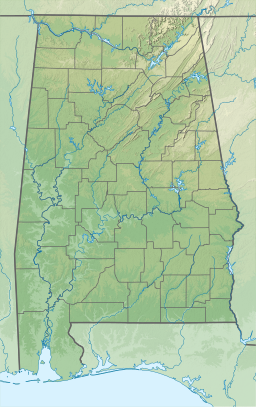Lewis Smith Lake
| Lewis Smith Lake | |
|---|---|
 Overhead satellite image taken in 2015 by Landsat 8 of Lewis Smith Lake located in North Alabama. | |
| Location | Cullman / Walker / Winston counties, Alabama, US |
| Coordinates | 33°56′32″N 087°06′21″W / 33.94222°N 87.10583°W |
| Type | Reservoir |
| Basin countries | United States |
| Surface area | 21,000 acres (85 km2) |
| Max. depth | 264 ft (80 m) |
| Surface elevation | 510 ft (160 m) |
| Islands | Goat Island |
Lewis Smith Lake, also known as Smith Lake, is a reservoir in north Alabama. Located on the Sipsey Fork of the Black Warrior River, it covers over 21,000 acres (85 km2) [1] in Cullman, Walker, and Winston Counties. The maximum depth at the dam is 264 feet (80 m). It is the deepest lake in Alabama. The three-fingered reservoir has over 500 miles (800 km) [1] of shoreline, and at full pool has a level of 510 feet (160 m).[2]



The lake was created by Alabama Power with the construction of the Lewis Smith Dam. One of the largest earthen dams in the eastern United States, it stretches 2,200 feet (670 m) in length and reaches a maximum height of 300 feet (91 m). Construction began on November 25, 1957, and the dam entered service on September 5, 1961. The name honors Lewis Martin Smith, president of Alabama Power from 1952 to 1957.[3]
Nearby towns include Bremen, Cullman, Good Hope, Crane Hill and Dodge City in Cullman County; Curry and Jasper in Walker County; and Addison, Arley, Houston, and Double Springs. The western side of Smith Lake is partially surrounded by William B. Bankhead which offers camping along the lake's shoreline.[4]


Tourist attractions are: Indian head cliff jump (30 ft), Castle Rock (40–50 ft), and the Castle.
| Reservoir Facts | Dam Facts | |||
|---|---|---|---|---|
| Elevation Above Sea Level | 510 Feet | In Service | September 05, 1961 | |
| Area | 21,200 Acres | Capacity | Two Generators; Rating 78,750 Kilowatts Each | |
| Shoreline | 642 Miles | Type | Rock-Fill | |
| Length | 35 Miles | Length | 2,200 Feet | |
| Maximum Depth at Damn | 264 Feet | Maximum Height | 300 Feet | |
| Area of Watershed Draining Into Reservoir | 944 Square Miles | |||
History
[edit]Due to the demand of coal along the Black Warrior River in the late nineteenth and early twentieth century, a series of locks and dams was added north of the city of Tuscaloosa. To better regulate the water levels in these locks and dams, local business leaders pressured the federal government to build a dam on the upper fork of the Sipsey Fork tributary of the Black Warrior River. The planned lake would also provide additional power to the surrounding area during peak hours as well as provide a source of recreational income to the otherwise sparsely populated area.[6]
On July 27, 1954, Alabama Power filed an application with the Federal Power Commission for construction of the lake. Construction began on November 25, 1957, and the dam was formally dedicated on May 23, 1961 at a cost of $29 million. [5]
For the first 20 years, the lake remained relatively undeveloped. During the 1980s and 1990s the lake saw a rapid growth in recreation due to proximity to Birmingham and Huntsville.[6]
Today the lake is used primarily for recreation. However, during the summer, its power plant is used during peak loads.[6]
References
[edit]- ^ a b Smith Lake – Freshwater Fishing in Alabama's Reservoirs Archived 2007-12-22 at the Wayback Machine
- ^ "Home". smithlake.info.
- ^ "Lewis Smith Dam and Lake". encyclopediaofalabama.org. Archived from the original on January 10, 2015. Retrieved May 7, 2023.
- ^ "Clear Creek Recreation Area". US Forest Service. Retrieved September 26, 2023.
- ^ a b Etress, Josh. "Smith Lake | Lake Level and Dam". Alabama Power Shorelines. Retrieved December 10, 2024.
- ^ a b c "Lewis Smith Dam and Lake | Encyclopedia of Alabama". Encyclopedia of Alabama. Retrieved June 1, 2018.
- Bodies of water of Cullman County, Alabama
- Reservoirs in Alabama
- Bodies of water of Walker County, Alabama
- Bodies of water of Winston County, Alabama
- Dams in Alabama
- Hydroelectric power plants in Alabama
- Alabama Power dams
- Dams completed in 1961
- Protected areas of Cullman County, Alabama
- Protected areas of Walker County, Alabama
- Protected areas of Winston County, Alabama


